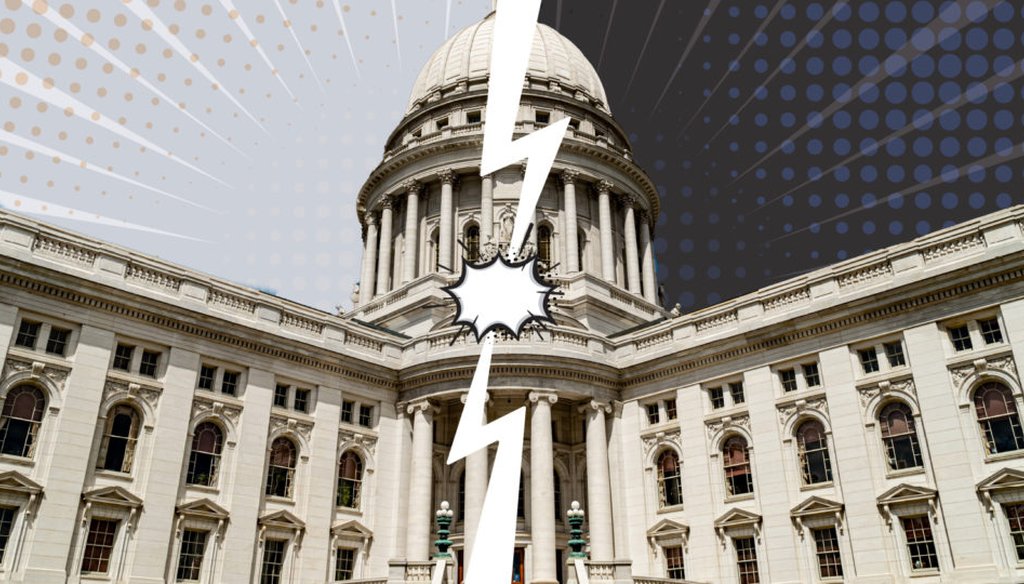Stand up for the facts!
Our only agenda is to publish the truth so you can be an informed participant in democracy.
We need your help.
I would like to contribute

PolitiFact and the Poynter Institute are offering free training for journalists on Tuesday, Sept. 20, 2022, to stay sharp during the midterms.
If Your Time is short
- PolitiFact is fact-checking claims about the U.S. voting system and claims about voter fraud.
- PolitiFact is also partnering with the Poynter Institute for Media Studies on training for journalists to better report on increased intimidation, threats and violence surrounding the democratic process.
- Training is available for free for jounalists, and out fact-checks are available to be republished. For more information, contact [email protected].
Disinformation about election processes and alleged election fraud is falsely stoking anger among voters who feel neglected by their government. That same disinformation — perpetuated by online elements and amplified by some pundits and politicians — has created tense situations across the United States. As Americans head toward the 2022 midterm elections, there is no evidence these pressures are waning.
With support from the Joyce Foundation, PolitiFact is working with the Poynter Institute for Media Studies on a series of programs to address these challenges.
The Poynter Institute is training journalists so that they can be better prepared to cover and report on issues related to voter suppression and intimidation. And PolitiFact is holding politicians, pundits and online actors accountable by debunking election-related disinformation ahead of the 2022 election. That work is free and available to publishers across the country.
Though it received the most global attention, the insurrection at the U.S. capitol is just one example of a disinformation-fueled attack on the American democratic process. And it didn’t end the trend toward mainstream extremism. How do you cover elections for a public that is extremely fractured? This free online seminar will help local journalists stay safe and produce ethical, excellent stories about voting, security and local issues leading up to the 2022 midterms and beyond.
PolitiFact fact-checks are available to be republished. For information, email [email protected].
Debunking the zombie claim that ‘dead people always vote Democrat’
Kevin Rinke, a Republican candidate for Michigan governor, said in an ad that "dead people always vote Democrat." Not every case of voting on behalf of the dead has been discovered, adjudicated in court, and received media coverage. However, six cases that have surfaced during the past five years produced either a plea of guilty or no contest, and in each case the defendant was either a registered Republican or acknowledged voting for Trump. Even this small number of cases is enough to invalidate Rinke’s sweeping statement that only Democrats do this. Usually when such cases occur, it involves individuals who fill out a mail ballot in the name of a close family member who has died. We rated this statement False.
Arizona Republican secretary of state candidate wrong about ‘fake’ mail ballots
Mark Finchem, the Republican running for Arizona secretary of state, said, "In Arizona, we have flood the zone with fake ballots."
Finchem’s description suggests that ballots are mailed out en masse to voters that did not request them. But that’s now how it works — and there’s no evidence of pervasive fraud or fakery.
Arizona voters must take steps to receive a mail ballot, whether it’s for a specific election or a continuing basis. Finchem’s statement is an inaccurate and ridiculous summation that could discourage voter participation in a legitimate process. We rate this claim Pants on Fire!
How Tom Cotton misleads about ranked choice voting in Alaska
Cotton tweeted "60% of Alaska voters voted for a Republican, but thanks to a convoluted process and ballot exhaustion — which disenfranchises voters — a Democrat ‘won.’" Mary Peltola, the Democrat,achieved a legitimate win in a state in which the electorate approved ranked choice voting as the law. We rated this statement Mostly False.
Nevada Republican echoes Trump’s Pants on Fire about 'rigged election'
State and federal officials — including Trump’s own attorney general — rejected Trump’s allegations that there was widespread fraud in a rigged election. Marchant lost his bid for Congress to the Democratic incumbent in 2020. There was no evidence of widespread fraud in that race, either. Democrats have routinely won races in that county for a decade. We rate this statement Pants on Fire!
Arizona Republican said he doesn’t ‘care for’ mail voting. He used it 28 times
During a debate for the position of Arizona secretary of state, Republican Mark Finchem said "I don’t care for mail-in voting. That’s why I go to the polls." Finchem voted by mail 28 times between the 2004 general election and 2020, his voting history file from Pima County, Arizona, shows. He was on a list to automatically get a mail ballot starting in 2008 and submitted paperwork in April indicating he no longer wanted to be on that list. We rated Finchem’s position on voting by mail a Full Flop.
It’s not unconstitutional for Colorado to mail ballots to registered, active voters
An Instagram post said that ballots are "mailed unconstitutionally" to every voter in Colorado.
Colorado’s constitution says elections must be conducted by ballot, but it does not specifically address voting by mail. State law dictates procedures for voting by mail. The practice is secure and has been used in Colorado for years. It has not been found to be unconstitutional. We rated this claim False.
Instagram post falsely says ‘2,000 Mules’ proves Democrats cheated
An Instagram post says that the documentary "2,000 Mules" proves Democrats "cheated on the 2020 elections."
Elections and law enforcement officials in battleground states have said that they have not received evidence to prove the allegations in the "2,000 Mules" movie that suggests widespread cheating via ballot drop boxes. Barr, attorney general under Trump, also publicly rejected the movie’s premise. We could find only two cases of individuals convicted related to violating rules about ballot drop boxes.
We rate this statement False.
No, Postal Service workers cannot ‘do anything they want’ to mail-in ballots
An Instagram video claims voters should not mail in their ballots through the U.S. Postal Service because employees could destroy them and encourages people to send them through the U.S. Post Office instead.
The U.S. Postal Service is the nation’s only postal service, and the post office is a colloquial term used for the agency. Postal Service employees are prohibited by federal law from destroying or tampering with election mail, including ballots. We rate this claim Pants on Fire!
Election officials, lawmakers in Congress have faced increase in threats
Sen. Amy Klobuchar, D-Minn. said "one in six local election officials have received threats of violence," that threats against judges have doubled over four years and threats against members of Congress have increased by 10 times over five years.
A survey done for the Brennan Center earlier this year of about 600 local election officials nationwide found 1 in 6 faced threats. Government data shows that threats against officials who work in federal courthouses including judges, plus against lawmakers, have increased in recent years. We rated this statement Mostly True.
No, every vote wasn’t previously counted on election night
An Instagram post said the U.S. "could easily count every vote in every state on election night until a few years ago."
The increased use of voting by mail in recent elections has slowed ballot counting.
However, the claim is too sweeping and ignores examples of recent national or statewide contests that remained undecided for weeks or months after Election Day.
Some cities or counties may release unofficial counts on election night, but they usually continue counting for days as officials sort out absentee ballots or provisional ballots. States’ deadline for official results is not on Election Day.
The biggest factor in news outlets’ ability to call a race is not the number of ballots counted but the competitiveness of the race.
We rated the statement Mostly False.
See more fact-checks at politifact.com/elections.
PolitiFact is creating a series of stories to better understand the big issues when it comes to voting and democratic processes. The explainers, which are available to republish, help readers understand issues like voter fraud, how the election process functions, and what laws that govern election security and election intimidation, among other issues. For information about republishing these stories, email [email protected].
The faulty premise of the ‘2,000 mules’ trailer about voting by mail in the 2020 election
A documentary by Dinesh D’Souza, a far-right commentator, furthers the myth that something sinister occurred with mail ballots and ballot drop boxes during the 2020 election. D’Souza told Fox News that "mules" delivered 400,000 illegal votes. Experts say the evidence D’Souza points to is inherently flawed. "If there is credible evidence, where is it?" said Kenneth Mayer, a professor of political science at the University of Wisconsin-Madison. "This is not it."
Democracy experts support Alaska’s move to ranked choice voting. Here’s why
In 2020, Alaska voters approved a change in their voting system to ranked choice voting. For the general election, voters rank the candidates in order of their preference. As soon as one candidate wins 50% plus 1, they win, going as many rounds as it takes. Ranked choice voting has previously been used in Maine as well as multiple cities as varied as jurisdictions in Utah to New York City. Democracy experts say ranked choice voting makes it less likely that an ideologically extreme candidate can prevail by winning a small plurality of the vote in a crowded primary.
How ‘Stop the steal’ Republicans seeking office hope to restrict voting
A coalition of more than a dozen Republicans is running on a shared platform that would make big changes to how U.S. elections operate. They have campaigned on the false premise that there was widespread fraud in the 2020 election. The coalition’s platform includes wiping out early and mail voting, two options that have grown in popularity with voters, and requiring almost everyone to vote on Election Day. The coalition’s platform poses risks for voters and threatens democracy.
A coalition of ‘stop the steal’ Republicans aims to take control of US elections. QAnon is helping
The coalition of Republicans running to take control of the chief elections offices in swing states includes the involvement of a mysterious but influential promoter of the QAnon conspiracy theory, who goes by the alias "Juan O Savin." Some adherents of the movement falsely believe he is the late John F. Kennedy Jr. in disguise.
Poll workers are short-staffed, under attack — and quietly defending democracy
Falsehoods about voting, threats and the lingering effects of COVID-19 have made recruiting poll workers more challenging, but they are stepping up nationwide. Poll workers told PolitiFact that they’re motivated by a desire to contribute to their communities, to get a closer look at how elections operate and to help enable their neighbors to cast ballots.
What journalists need to know about the laws on covering elections
When a journalist is covering the process of voting – whether it’s for mayor, governor or U.S. Senator – the goal is the same: show the public the truth about the administration of elections. Accurate reporting about elections helps reduce the spread of unfounded rumors. We explain the types of information journalists should gather months before Election Day such as the laws about photographing election sites, obtaining public records and how to prepare to cover potential protests.
Why many voters in Arizona, Missouri will use voting centers, not precincts, on Election Day
Vote centers were pioneered by Larimer County in Colorado in 2003 to reduce costs and give voters more convenient choices. Vote centers are now allowed in 18 states including Arizona. St Louis County, Missouri transitioned to vote centers in 2020 due to pandemic-related shortages for polling sites and poll workers. We explain the benefits and potential pitfalls of vote centers in a story.
Before election, Michigan Republicans blast Secretary of State Benson for her oversight of last one
Hoping to score midterm election victories, Republican candidates and the Michigan GOP are focusing their ire on Democratic Secretary of State Jocelyn Benson — specifically, how she oversaw the 2020 election. We fact-checked some of the allegations of misconduct leveled against Benson.
How could U.S. voting be affected if election deniers win?
Midterm ballots in nearly every state include candidates who believe the 2020 election was fraudulent or "stolen." That leaves American election systems at a pivotal moment: If people who deny Joe Biden won the presidency win their own elections Nov. 8, could they really execute their plans and dismantle the machinery that keeps American democracy running? We explain what they could try to do – and what they can’t do unilaterally – in a story.
Not all results will be known on election night 2022. That’s normal
Americans may not know on election night which party will control the House or Senate in 2023, if the results are close in multiple states with hot congressional races. It might take days, or longer, to count enough ballots to know with reasonable certainty the outcome of key races, said Joe Lenski, co-founder and executive vice president of Edison Research, which conducts exit polls for major networks. We explain why results take time and how to watch out for misinformation.
Absentee voters can still cast ballots by mail in Delaware
A post stated that mail in voting "is now BANNED in Biden’s state!" The post overstates the impact of the Delaware Supreme Court’s recent ruling. In June, the state’s Democratic-controlled legislature passed a law that would have enabled all registered voters to cast a ballot by mail for any reason. The court struck that law down. But the existing state law that allows for absentee voting for specific reasons – such as being a student, or on vacation or having a disability – remains in place.
PolitiFact answers reader questions about the midterms
With the midterm elections quickly approaching, we asked readers to send us any lingering questions they had before heading to the ballot box. Our reporters investigated queries about changes have been made to the voting process since the 2020 presidential contest and about election deniers. We answered readers’ questions in a story.
Marco Rubio said someone could blow up a ballot drop box, ignoring safe track record
"There’s danger involved in drop boxes," Sen. Marco Rubio, R-Fla., said in the Oct. 18 debate with his Democratic rival, U.S. Rep. Val Demings. "People need to think about it. OK. Imagine someone decides, ‘Oh, there’s a drop box. I’m just going to put some explosive and and blow it up and burn all of those ballots’ and now those votes don’t count at all.’"
We can’t predict the future, but we can look at the past. Rubio’s statement defies two decades of experience nationwide in millions of Americans safely using drop boxes. We explain what we know about the safe use of the boxes in a story.
This story was updated Nov. 4, 2022.
Sponsored by

Our Sources
Covering Political Extremism in the Public Square registration page
About the Joyce Foundation








































